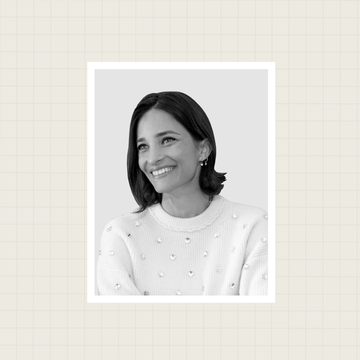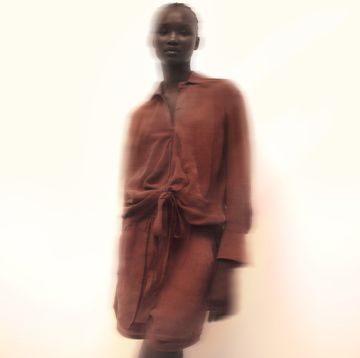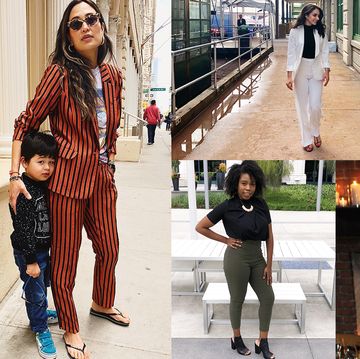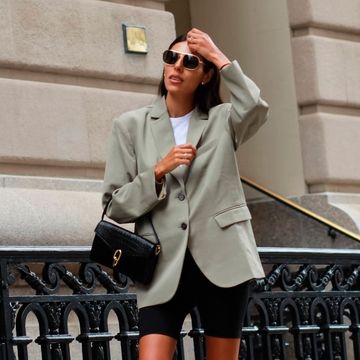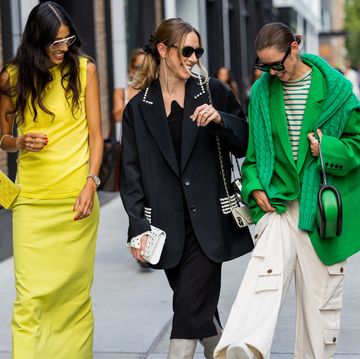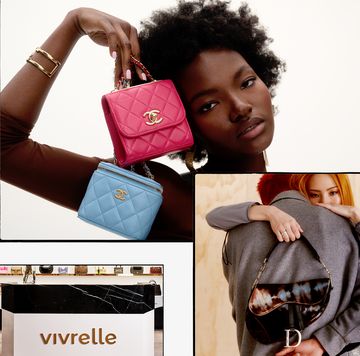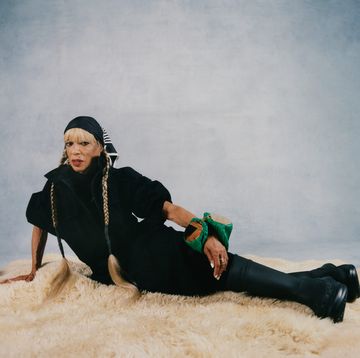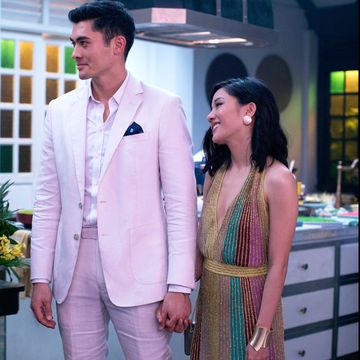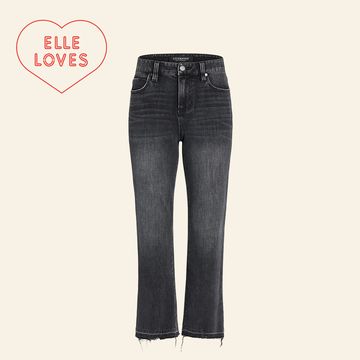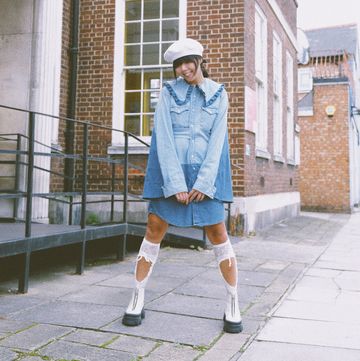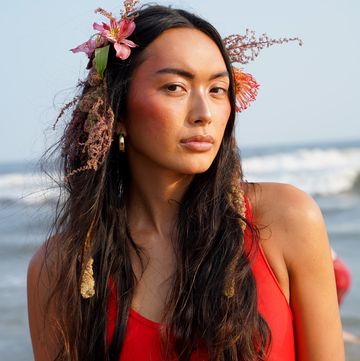If quarantine has been good to anyone, it’s Zerina Akers. Trace her steps from the beginning of the lockdown to now and you’ll embark upon a whirlwind journey rooted in storytelling—an integral part of her brand. As she tells me over the phone, quarantine has been “over” for her for a while. Akers isn’t saying she’s abandoned COVID-19 protocols, rather she’s used the period of stillness to recharge.
"I think at the beginning it was nice to have time to try new things—starting an earth garden, cooking, doing a puzzle, and sitting on the couch and doing nothing,” she explains. “But now, I've kind of fully pressed forward on working on different projects and evolving my brand into something that could stand on its own." Akers’ quarantine tells the tale of dynamic sister duo Chloe x Halle, who ushered in a mature era with futuristic latex and chains, as well as the celebration of and homage to the Black diaspora through costumes in Beyonce's Black Is King.
Akers has spent her decades-spanning career using fashion to tell the stories of others, but quarantine provided her enough space to tell her own story. Black Owned Everything was just the start. Launched at the height of the pandemic, at a time where moments of Black joy were few and far between, Akers created the Black Owned Everything Instagram account to highlight emerging and established Black-owned brands in fashion, home goods, beauty, and more. She expanded the Instagram account into an e-commerce site that hosts pieces from Fe Noel, Brandon Blackwood NYC, Salone Monet, Skin Butter, Aliette, and more. Then she designed for Macy’s Icons of Style campaign. Simply put, Akers is the face of the Booked and Busy movement right now, which brings us to the latest stop on her tour: Styling Zales’ Mother’s Day campaign.
Ahead, Zerina Akers talks about navigating the fashion industry during her early days, collaborating with Zales, and Black Owned Everything’s next steps.
How was last year both challenging and rewarding for you?
Challenging because a lot of people were affected in a negative way. A lot of my friends lost their parents or grandparents, lost a lot of people in their family, and trying to navigate through all of that. Rewarding because I was able to do so many different things and work on so many different projects. I'm thankful for the time I was able to create cool content with Chloe and Halle on their tennis court; designing and collaborating with Macy's, starting a foundation. Without the lockdown, I probably have had the time to dig into what made that happen.
At what age were you aware that fashion could be more than just putting on clothes, but something that could be a viable career?
I think it kind of came in different phases. When I was about four years old, my parents put me in an Easter dress that I never wanted to take off. They had to practically hide the dress from me because I wanted to go to the playground in it and wear it all the time. That was the moment I realized clothes make you feel good. And I'm still that way to this day. If I find something I love, I just wear it all the time. We tend to not wear our clothes because we want to save them for a special occasion and you never even get to enjoy them. I want that feeling all the time, to actually fully enjoy clothes.
I remember being in middle school, looking at fashion magazines, and wanting to name the brand and name the designers before I looked at the credit. I would kind of quiz myself and play around like that. When I became aware that I was actually entering the industry and realizing its depth and how much you really could do, I truly didn't learn until I became an intern at W Magazine. That for sure was like, Oh, okay, you can do this, moment.
How did those experiences growing in the industry as a young, Black stylist inform who you are and how you navigate the industry now?
It's changed so much. When I started at W Mag as an intern, I was the only black girl in the office. And then maybe a few weeks later they hired Shiona Turini, she was an editor at the time. I thought there was an expectation to speak a certain way and act a certain way. I realized that if you just be yourself, no matter what that is, you can go so much further.
Now with social media, everyone can just call themselves a stylist and then end up actually becoming a stylist. Back then, the fashion industry felt much more elitist and exclusive and, in a way, less tangible. Those days you really had to dig into that mindset to figure out how to become an assistant. There were a lot of hierarchies where you can't speak in this room, or at this time. So I learned how to give my opinion and voice in a way that won't affect the job on hand. I still teach some of those things to my assistants, but without all the fear, that Devil Wears Prada kind of mentality. People are always surprised by me and say "Oh, you're actually nice."
How did little Zerina dress growing up?
She was a lanky little thing thinking that she knew what she was doing. I followed the trends. I grew up in Maryland, we had very weird trends. We would wear leggings, stretch pants, an oversized t-shirt, and slouched socks over your pants, multiple socks. I realize now that there were things that people did out of necessity. Who can wear two pairs of socks to fit their shoes? No, your mom was buying your shoes too big., and then it was adapted as a trend.
How do you approach styling yourself right now?
I like what makes me feel good. I like to kind of play to different parts of my personality. At times, I like to feel powerful—period. I love strong shoulders and longer, leaner silhouettes. I've always been a fan of suiting and monochromatic suiting. I kind of have a tomboy side.
Has quarantine changed your approach to dressing at all?
Oh, I'm a sweatsuit girl, even with Black Owned Everything. I feel like I made the perfect set for BOE. When you put that sweatsuit on, it's big, you don't have to wear anything under it. It's good for New York weather, they're good for LA weather. I keep wearing it.
You styled Zales' Mother's Day campaign. What is the Zerina Akers guide to spring accessorizing?
I mean gold is forever a jam, right? I'm personally super into mixing metals. So mixing silver and gold because I tend to just have pieces that I love, whether they're silver or gold. Sometimes I don't want to take a necklace off because it's my favorite necklace and it means something to me. So I stack my gold chains or fashion chains on top. The same thing speaks to the rings. Whether my grandmother gave them to me, I mix them and layer them all together.
Black Owned Everything in 2021 looks like—
Exciting.
I know that the e-commerce site was an extension of the Instagram account, but I'm wondering if the Akers and Akers foundation is also an extension of the platform?
The Akers and Akers foundation originally was designed to work in partnership with Black Owned Everything. I wanted to create an organization where we could incubate designers and implement financial literacy programs in the community. Fom a brand perspective or from a designer perspective, they then could learn how to use those additional resources that we're pouring in or how to build a more sustainable business. When I started to actually form the organization, I was like, wait, I want to address any issues I see in the community. So, we're working to develop more financial literacy programs for younger adults.
Nerisha is the beauty commerce editor at ELLE.com, covering all things beauty (and fashion and music). She has a penchant for sneakers and nude lip glosses, and spends way too much time re-watching 90s sitcoms.


